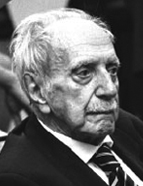

From then on, his professional life was entirely dedicated to the University of São Paulo, with short stays to teach courses in Bahia and Ceará and, in 1955, at the University of Coimbra. He was an active member of the Faculdade de Filosofia [School of Philosophy] and the University Council and headed the Department of History, the Faculdade de Filosofia, Letras e Ciências Humanas [School of Philosophy, Arts and Human Sciences] from 1972 to 1974, and the Escola de Comunicação e Artes [School of Communication and Arts] from 1980 to 1984. He was a renowned and sought-after professor and thesis advisor for over half a century, even after his mandatory retirement at the age of seventy. He contributed to the USP History Journal and, in its early years, to the Associação Nacional de Professores Universitários de História [National Association of University History Professors] (ANPUH), of which he was one of the founders and where he worked closely with Eurípedes Simões de Paula, professor of Ancient and Medieval History.
A great reader and researcher, he had a keen critical mind, which perhaps explains his historiographical output, which was rich and stimulating, although relatively limited. His first work was his doctoral thesis, O poder real em Portugal e as origens do absolutismo [Royal Power in Portugal and the Origins of Absolutism], which he defended at the age of 31. Five years later, he wrote his professorial thesis, Portugal na época da Restauração [Portugal at the Time of the Restoration]. His later works, published in conference proceedings and specialised journals, dealt with both methodological issues and topics in Brazilian history.
The main lines of his historical thinking include reflections on historical knowledge, including the use of concepts and sources and interpretations of the history of Portugal and Brazil, or rather, Luso-Brazilian history, since he was interested in the aspects common to the formation of both societies and the subsequent development of the tropical variant.
This work is financed by national funds through FCT - Foundation for Science and Technology, I.P, in the scope of the projects UIDB/04311/2020 and UIDP/04311/2020.
